JICUF Grantee Spotlight: ICU Honey Team
Do you know that there is a “Honey Team” at ICU that keeps bees? JICUF first encountered the ICU Beekeeping Project in the fall of 2019, when undergraduate student Yuki Tamaki applied for and successfully received a JICUF grant. In the application, she wrote: “We will set up beehives in the organic farm on campus and engage in beekeeping. We will use the funds obtained from the harvested honey to support activities aimed at saving bees from Colony Collapse Disorder (CCD), an unexplained phenomenon of mass disappearance of bees. The project will create opportunities for ICU students to think about and act on environmental issues.” The grant was used to purchase hive boxes and other equipment.
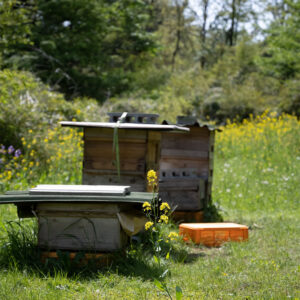
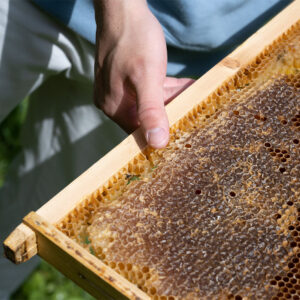
Originally scheduled to start in 2020, the project actually began in the spring of 2021 due to the COVID-19 pandemic shifting all classes online. Under the supervision of Associate Professor Jun Fujinuma, ICU Beekeeping started with just one hive box. With the guidance and cooperation of local beekeeper Yuki Kaneko, the students harvested 25kg of honey in the first year. The honey was bottled and sold at the ICU Festival. How thrilled the students must have been to hold the bottles of honey created by the bees they cared for!
Although the project as a part of the curriculum has ended, ICU Beekeeping has been taken over by the volunteer “Honey Team,” and as of 2023, it continues with six hive boxes. When JICUF staff visited ICU in April, we had the opportunity to meet the project representative Ryoichi Noguchi (third-year undergraduate student) and vice-representative Kimika Shiratori (second-year undergraduate student), who showed us the hive boxes while sharing their story.
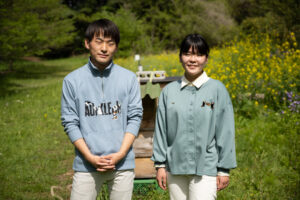
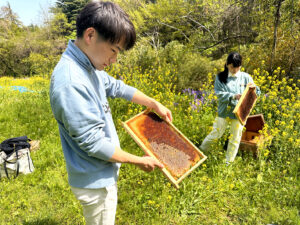
JICUF: Why did you become interested in beekeeping
Ryoichi: Since I was a child, I liked insects that live in groups like ants, and used to observe them. So when I heard about beekeeping on campus at ICU, I joined without a second thought.
Kimika: I simply love honey and thought it would be great to be able to eat fresh honey! That’s why I decided to participate.
JICUF: It’s a perfect teamwork between Ryoichi, who is interested in observing and caring for bees, and Kimika, who wants to enjoy eating honey!
JICUF: What are the responsibilities of the team?
Ryoichi: During the active period of bees from spring to summer, we need to inspect the hive boxes frequently. We check if there are any mites that could lead to the total destruction of the beehives, if they are being attacked by hornets, or if there is any separation of the nest due to the emergence of a second queen bee, and so on. It is manageable during the semester, but it becomes challenging during the summer when there are no classes. We have to coordinate the schedules of team members to make sure someone is always checking in. In the winter, we wrap the hive boxes with sheets for insulation, modify the beehive entrance for winter use, and place sugar water to ensure they have enough food.
JICUF: We heard that the harvested honey is gifted to donors and also sold at the ICU Festival. What feedback have you received?
Ryoichi: Fortunately, the feedback has been excellent, and the honey sells out quickly at the ICU Festival. After the honey was sold out, a foreign visitor told us, “I came to the school festival specifically to buy your honey, so I’m very disappointed!” I felt sorry for this visitor, but happy at the same time. It was meaningful to experience the joy of selling honey that we harvested ourselves.
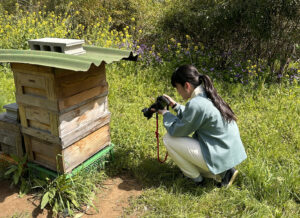
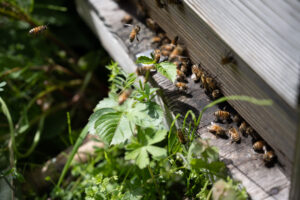
JICUF: What are your future goals?
Ryoichi: Currently, there are five to six students participating in beekeeping. I want more students to learn about ICU beekeeping and increase the team members. Many people are afraid of getting stung by bees, but it’s completely fine if you learn about their behavior and how to handle them. Bees are cute. (While Ryoichi was talking to us, Kimika approached the hive box without protective clothing and took close-up photos of the bees with a camera borrowed from our photo intern, Hinata Saito. The bees flying around didn’t seem to bother her at all. She demonstrated how it was “completely fine,” but we were told that they actually sting sometimes!)
Increasing the harvest is also a goal. We want to increase the sales of honey to invest in new hive boxes and materials, and make ICU beekeeping self-sustainable.Furthermore, while the bees that come to ICU are generally European honey bees, an introduced species, Japanese honey bees came for the first time last spring. We were all excited, but the indigenous bees were unhappy about something and suddenly disappeared. We want them to come back, so we are conducting research, and making hive boxes specifically designed for them.
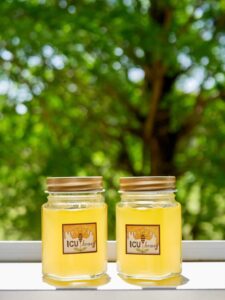
Beekeeping, which is said to have started 10,000 years ago, forms a sustainable cycle between plants and bees, bees and humans, and humans and plants. Are you interested in participating in beekeeping in a secret flower garden deep inside the ICU campus, where rapeseed flowers bloom?
Contact the ICU Honey Team at icuhoneyproject@gmail.com.



